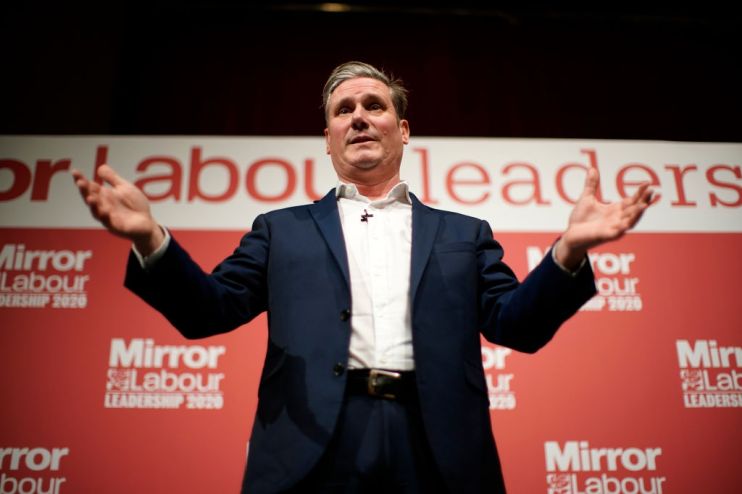Starmer and the City: Labour’s battle to win back the trust of UK business

After what feels like the longest three months in history, the Labour Party finally has a new leader. Sir Keir Starmer trounced his leadership rivals to win a commanding majority, leaving no doubt about his mandate to recreate the party in his own image.
The former human rights lawyer is now tasked with the job of burying the legacy of the disastrous Jeremy Corbyn project and restoring credibility to the party. Among the challenges will be to restore trust with the City of London and the wider business community.
Corbyn and former shadow chancellor John McDonnell’s calls for widespread tax hikes – including on financial transactions – mass nationalisations and eye watering increases in public spending scared off the financial services sector and induced predictions that Labour would tank the economy if handed power.
In 2018, Corbyn called the City “pernicious and undemocratic” and vowed to hammer the financial sector if elected. Savvas Savouri, chief economist at Toscafund Asset Management, said that “even Karl Marx would have had a better relationship with the City than Corbyn”, while every major business advocacy group denounced Labour’s manifesto at December’s General Election.
Iain Anderson, founder of communications firm Cicero Group, said Starmer would be keen to reset Labour’s relationship with the City.
Anderson said: “He’s certainly not a Blairite and he won’t want to be called a Blairite, but he’s much more pragmatic than Corbyn and I think will be much more willing to engage with the City and with business.
“One thing that will instil confidence in markets is that the government clearly trusts him to come in and work with the government closely in this [Covid-19] crisis in a way it did not feel comfortable with Jeremy Corbyn.”
While many predict Starmer will shift the party toward the centre, the former Director of Public Prosecutions has kept his cards close to his chest on the policy front. He gave very few policy details during the campaign and has even pledged to retain Corbyn’s policies of nationalising the rail, mail, energy and water sectors.
It was conjectured by some pundits that his commitment to these old guard positions was a way of deflecting attacks from Corbynite candidate Rebecca Long-Bailey during the campaign. One Labour backbench MP told City A.M. that the drastic change in economic conditions caused by the coronavirus outbreak could provide an excellent excuse for Starmer to quickly bin these promises.
Starmer’s newly unveiled shadow cabinet is a likely indication that Labour will return to an economic platform closer to Ed Miliband’s than Corbyn’s. Miliband himself is even back in the fold as shadow business secretary, while most of the frontbench is made up of MPs from the soft left and right factions of the party. All key Corbynistas, bar Long-Bailey, have been culled.
Key to resetting Labour’s economic direction of travel will be new shadow chancellor Anneliese Dodds. Dodds, on the soft-left of the party, was elected to parliament less than three years ago and served as a shadow Treasury minister under McDonnell. When asked by BBC Radio 4 this morning about which Labour chancellor she most admired, Dodds named fellow Scot Gordon Brown.
Anderson said Dodds would have a much better relationship with the Square Mile than McDonnell ever did.
“I’ve sat on some panels with her and she speaks clearly and with candour, but I think importantly she is a pragmatic politician – she’s not wedded to ideology like John McDonnell,” Anderson said.
“There was always a sense with Jeremy Corbyn and John McDonnell that they were talking at the City and the private sector and not with them.”
However, some in the City think Labour still has a very long way to go before restoring trust in the private sector. Markets commentator and Aquis Exchange consultant David Buik MBE said Starmer will still have to contest with the far-left elements in the Labour party, like pressure group Momentum.
“If anyone thinks that Momentum is going to go away – dream on,” he said.
“They are angry people who don’t have much and will have even less after coronavirus.
“The Labour Party is very angry right now and I think Starmer will have a huge problem of pulling them together.”
Hedge fund tycoon Crispin Odey said bluntly that no one would care about Starmer and his platform, particularly after the dust settles from the coronavirus crisis.
“The Conservatives have shifted to the left in a more collective style of government,” he said.
“In the process we haven’t even begun to debate the private sector and the City and I don’t feel people are very interested in the Labour Party now.”
Starmer undoubtedly has a large hill to climb to bring the Labour Party back to relevance, but his bold move to purge the Corbynistas from his frontbench is a positive first step. The next will be to try and upstage the government in fashioning a post-Covid-19 vision for a country that will be reeling from a very deep recession.